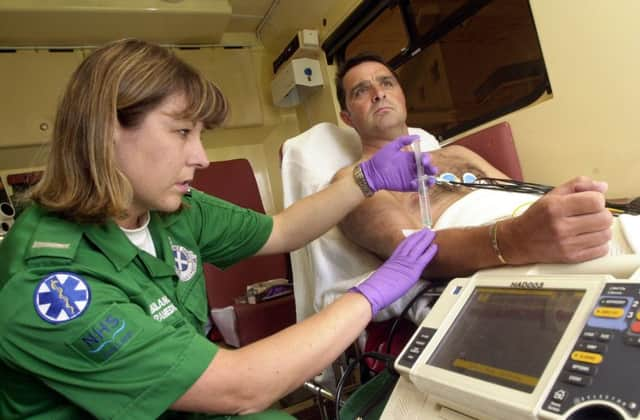Leaders: We dare not skimp on funding health


Already battle has been joined. The latest front is on funding for medical students which Scottish Labour claims has fallen by 5 per cent over the past six years. MSP and former GP Dr Richard Simpson says that the number of medical students receiving funding has fallen from 900 in 2008-9 to 848 in 2014-15.
Given the government debt pile and the need to halt the ever-rising annual burden of debt interest payments, the resultant squeeze on government spending has hit many services, although health is spared by a protective ring-fence and spending here is set to increase. However, this does not fully address the rising demographic pressures on health provision and, in this particular area, a looming shortage of doctors prepared to take on the responsibilities of general practice.
Advertisement
Hide AdAdvertisement
Hide AdDr Simpson, Labour’s public health spokesman, says the Scottish Government has been “negligent” in the face of a looming GP recruitment crisis. He accuses it of making existing problems even worse.
The administration says the figures “fail to take account of a number of complex changes” to medical student funding; that funding for general medical services has increased by 10 per cent and that record funding for general practice of £768 million has brought GP numbers to nearly 5,000, a rise of 7 per cent to the highest ever.
Expect this war of statistics to intensify as the election approaches. But the perception that will concern voters is how local GP services are being impacted and the increasing reliance on locums.
Separately, another health concern has come to the fore with a survey showing that more than 100 ambulance staff have reported seeing patient safety compromised because of a lack of resources. The survey of paramedics, ambulance technicians, call handlers and transport staff through the trade union Unite found more than nine in ten respondents saying they had “witnessed patient safety being compromised due to a lack of resources”. A similar high percentage said their job had become “more pressurised” .It was hardly likely that a trade union-backed survey was going to conclude otherwise. People today in many occupations find their work has become more pressurised.
That said, paramedics are “in the front line” doing invaluable, life-saving work. This should be all the more appreciated given the sustained increases in emergency demand. Hospital authorities should constantly ensure that numbers are up to the growing demands of the task.
Remembrance is a time for reflection
As if the atomic bomb dropped on Hiroshima was not devastating enough, that dropped on Nagasaki three days later was worse: It was made from plutonium and was even more powerful.
At least 70,000 people died and thousands suffered terrible injuries. The remembrance service held yesterday was a deeply emotional occasion, with a sombre speech by Japanese prime minister Shinzo Abe and calls for a world shorn of nuclear weapons.
But it is as well to remember what led up to the bombing as well as to reflect on the future. The war was launched by a viciously militaristic regime in Japan.
Advertisement
Hide AdAdvertisement
Hide AdThousands of Allied prisoners died in prisoner of war camps while others endured torture and suffering which scarred them for life. The attacks on Hiroshima and Nagasaki, horrific though they were, brought this vicious regime to its knees and the conflict to an end. It also spared tens of thousands of Japanese lives that would have been lost in an Allied invasion.
No-one wishes to see nuclear weapons used again. And despite the forebodings in the years after these devastating nuclear attacks, the world has been spared a repetition – arguably because of the deterrent effect of the scale of suffering. The world had indeed been held in a nuclear embrace but one in which knowledge of the use of such weapons has helped ensure, even with their proliferation, they were not unleashed. This stand-off has endured for 70 years. Mr Abe was given a potent warning by a survivor to keep Japan’s pacifist constitution intact. It is as telling a message now as ever.